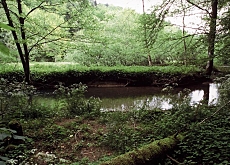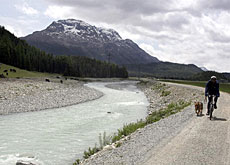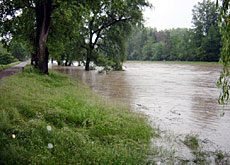Ecosystems sourced as key to water security

Swiss officials attending the World Water Week opening on Monday in Stockholm will insist on the importance of protecting terrestrial ecosystems.
These systems help ensure the quality and quantity of water available. The Swiss will be presenting a code of conduct on payments for ecosystem services in water management.
In recent years, terrestrial ecosystems have become considered an integral part of water management. For the Swiss authorities, this approach is the first, and perhaps cheapest, step to guaranteeing a sustainable and high quality water supply.
“Rain doesn’t land directly in a river or a lake, but on a mountain – wooded or not – or a plain,” said Sibylle Vermont of the Federal Environment Office. “These ecosystems do us a service, storing and filtering water for example.”
This means that for Swiss ecosystems such as wetlands, forests and soils need to be protected and managed in a sustainable fashion.
Forests are needed to ensure water quality and to mitigate flooding. Protection however does not mean that human activities need to be banned.
“We want sustainable forestry management in Switzerland,” Vermont told swissinfo. “Some forests need to be properly managed by felling trees or clearing certain areas to sustain or improve their filtration capacity.”
Farmland
Farmers can also help improve protection of aquatic resources. Agriculture is responsible for roughly three quarters of the nitrates – used in fertilizers – that can be found in groundwater.
Therefore to receive state funding, farmers have to fulfil ecological criteria such as leaving seven per cent of their land – grasslands or hedges – as a semi-natural habitat.
They can get additional payment if they implement further measures to protect water sources to compensate for the loss of income.
“For instance, we pay farmers to reduce their use of land to protect marshland of national or regional importance,” added Vermont.
Today, Switzerland is cited as an example, and the European Union is following its lead as it tries to cut back its agricultural production while improving the quality of the environment.
Restoration
The Swiss have made their mistakes in the past. The development of hydroelectric power, the taming of rivers and draining of wetlands to increase food production and deforestation left its scars and damaged ecosystems.
The trend today moves in the opposite direction – waterways and floodplains are being rejuvenated. The benefits of this policy were demonstrated dramatically in 2005.
“Areas where rivers and streams follow natural courses didn’t suffer as much from [major] flooding last summer,” said Vermont. Cantons Bern, Lucerne and Obwalden saw huge damage after massive rainfall caused flooding and landslides, and the final cost is still being tallied.
The Federal Environment Office has been pushing for an international code of conduct on payments for ecosystem services in water management for those who contribute to the preservation or restoration of ecosystems. This should be adopted at the next meeting of the parties of the United Nations Economic Commission for Europe’s Convention on the Protection and Use of Transboundary Watercourses and International Lakes in November.
It is based on the general consensus that the services derived from ecosystems provide benefits that help ensure human wellbeing, and that paying for these services is instrumental to sustainable water management. The code is meant to provide the means to establish and use these payments.
World Water Week will be an opportunity for the Swiss to promote the code.
But Vermont says the event in the Swedish capital, which brings together government officials, non-governmental organisations, researchers and water specialists, is not so much a place where decisions are made as a forum where opinions and ideas can be exchanged.
“It’s an opportunity to show what we can offer others and see what we can learn from them,” she added.
swissinfo, Scott Capper
Water is probably the most important natural resource in Switzerland. Readily available water is about 3 times the European average, which is sufficient to meet all essential needs.
Thanks to a network of wastewater treatment plants, the pollution of surface water by households is now relatively low.
Generally, water pollution by industry is not a problem as the water it releases is of good quality after treatment.
But pollution from agriculture remains a major problem for both surface water and groundwater, due to phosphates and nitrates found in chemical fertilisers and manure.
Switzerland has 6% of all freshwater reserves in Europe.
Lakes and reservoirs account for half the stored water, glaciers 28%, groundwater 20% and rivers and dams 2%.
Daily water consumption per inhabitant is about 400 litres. This includes industrial, agricultural and domestic uses of water.
The 2006 World Water Week is taking place in Stockholm from August 20-26.

In compliance with the JTI standards
More: SWI swissinfo.ch certified by the Journalism Trust Initiative











You can find an overview of ongoing debates with our journalists here . Please join us!
If you want to start a conversation about a topic raised in this article or want to report factual errors, email us at english@swissinfo.ch.